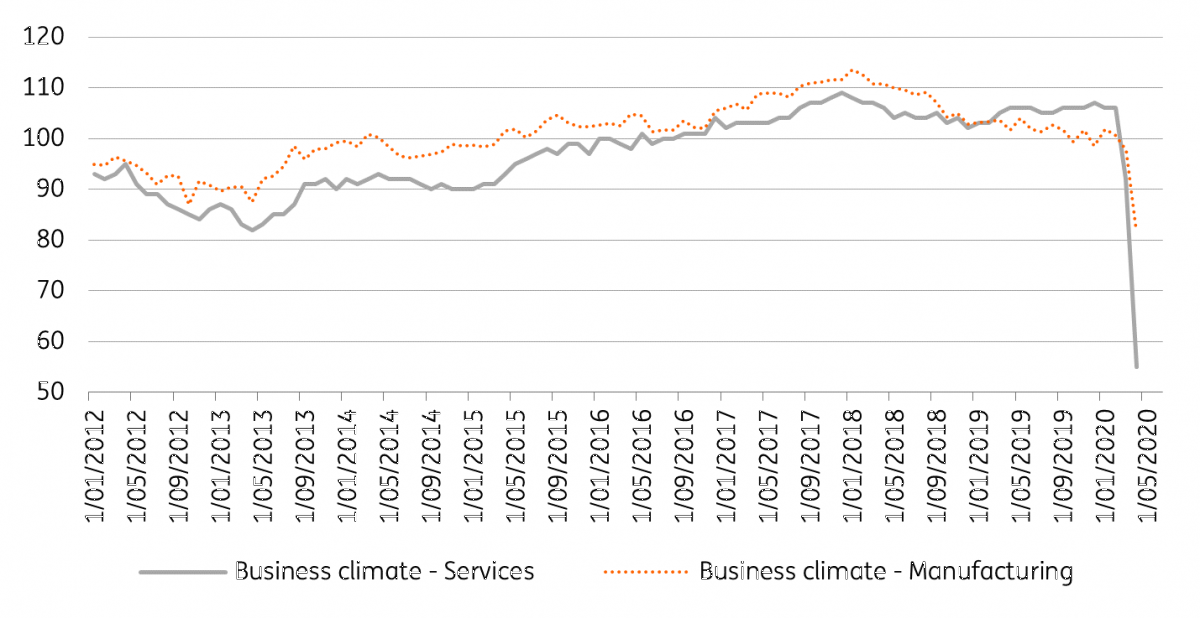A huge decline in French economic confidence, but sector differences remain
In France, the main business climate indicator posted an unsurprising decline. However, the details of the survey reveal significant differences between sectors and show the effectiveness of safeguarding measures, while confirming some pitfalls
Service confidence is at an all-time low
Confidence in the French service sector fell to an all-time low in April, plunging from 92 to 55, a figure that PMI indicators (at 29 in March and 27.4 in April) had previously suggested. At the height of the 2009 crisis, the indicator had fallen to 67. Note that the survey's components relating to recent activity declined less than at that time, reflecting the suddenness of the current shock. These figures, at least for now, suggest that firms are more positive about their situation than in 2009 perhaps due to the measures introduced by the government.
It is noticeable that the employment trend, as measured by recent hirings as well as intentions, has deteriorated more sharply for temporary workers than for employees who benefit more easily from partial unemployment measures. More than one employee in three is currently benefiting from the schemes. These figures show that the policies in place have made it possible to limit the fall in entrepreneurs' confidence in the state of their own business and to limit the damage to employees. On the other hand, they illustrate the fact that temporary workers, who are generally already less protected, are more likely to end up unemployed this time once again.
Confidence indicators for the retail sector continue to illustrate the atypical consumption behaviours of this period, for example through the continued high level of expected sales of food products (and the continuing fall in most other categories).
Sharp drop in confidence in April

Industrial confidence is faring better
The industry confidence indicator fell much less than expected to 81.9 after 97.7 in March; the April figure is still well above the 2009 low of 66.1. This is all the more astonishing given that capacity utilisation had fallen from 78% to 56% in March, compared to a 70% low during the financial crisis. Indeed, despite this drop in capacity utilisation, the survey shows recent output decreasing but it's not in freefall. This probably means that the figure for May will be even worse. In contrast to service companies, manufacturing companies are as negative today as at the worst point of the 2009 crisis about their own situation; their confidence in the general economic outlook is at an all-time low.
A positive element of the survey, which partly explains why the decline in confidence is not as large as expected and illustrates the importance of the supply shock (in the sense of an inability to produce), is the relatively good performance of order books. Of course, they are not well filled, but are comparable to those of 2013, far from the low point reached in 2009.
Strong recovery measures are needed
The April confidence indicators confirm that only 65% of the French economy is functioning during the lockdown. The lengthening of this period until May 11, therefore, means that the GDP contraction in 2Q20 could reach unprecedented proportions and that a strong recovery plan will be needed if we're to avoid a worse recession the government's currently expecting, that of an 8% contraction in 2020.
Download
Download article"THINK Outside" is a collection of specially commissioned content from third-party sources, such as economic think-tanks and academic institutions, that ING deems reliable and from non-research departments within ING. ING Bank N.V. ("ING") uses these sources to expand the range of opinions you can find on the THINK website. Some of these sources are not the property of or managed by ING, and therefore ING cannot always guarantee the correctness, completeness, actuality and quality of such sources, nor the availability at any given time of the data and information provided, and ING cannot accept any liability in this respect, insofar as this is permissible pursuant to the applicable laws and regulations.
This publication does not necessarily reflect the ING house view. This publication has been prepared solely for information purposes without regard to any particular user's investment objectives, financial situation, or means. The information in the publication is not an investment recommendation and it is not investment, legal or tax advice or an offer or solicitation to purchase or sell any financial instrument. Reasonable care has been taken to ensure that this publication is not untrue or misleading when published, but ING does not represent that it is accurate or complete. ING does not accept any liability for any direct, indirect or consequential loss arising from any use of this publication. Unless otherwise stated, any views, forecasts, or estimates are solely those of the author(s), as of the date of the publication and are subject to change without notice.
The distribution of this publication may be restricted by law or regulation in different jurisdictions and persons into whose possession this publication comes should inform themselves about, and observe, such restrictions.
Copyright and database rights protection exists in this report and it may not be reproduced, distributed or published by any person for any purpose without the prior express consent of ING. All rights are reserved.
ING Bank N.V. is authorised by the Dutch Central Bank and supervised by the European Central Bank (ECB), the Dutch Central Bank (DNB) and the Dutch Authority for the Financial Markets (AFM). ING Bank N.V. is incorporated in the Netherlands (Trade Register no. 33031431 Amsterdam).